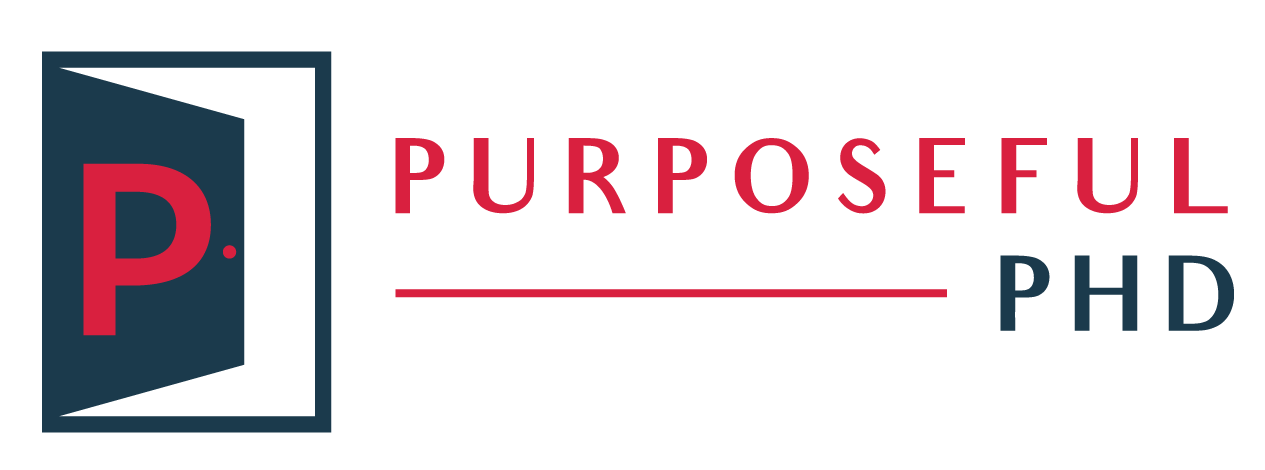
One of the most dreadful questions that you can get while working on your doctoral degree is to the effect of “What’s next after your PhD?” The angst that this often warm-hearted, sincere, and genuinely curious question can give is real. It conjures up for many students’ feelings of anxiety because they don’t have an answer to that question. They feel like failures because some of their peers have these lofty plans all figured out and they can’t even begin to think about what’s next after the degree because the truth is there are way too many trees and weeds that have to be cut down with their degree work first, that thinking of anything beyond that is literally just too much. Add on to these feelings that many doctoral students generally don’t figure out the next step after the Master’s or PhD until the frantic 3 to 4 months before their dissertation defense. Often this leads to limited options or students just settling for anything so that they can just get out and move on.
And all of this, I totally get.
But in all honesty, this dreadful question needs to be one that students visit prior to signing on to a graduate program, when they start a graduate program, and throughout the course of completing the dissertation work. What is clear to me now and especially in the initial years after my PhD, is that I missed many opportunities to really sit with this question. Of course, in graduate school the only thing that is important is your research and papers right. So, who has time to think about career and life goals when they are just too far away anyway.
Each student, each of you, has different gifts and talents as well as aspirations for the things that you want to accomplish in your life. Not the life of your advisor. Not the life of your parents. Not the life of your peers. Your life. The Masters or PhD degree should be seen as a credential or vehicle to help you fulfill your aspirations, whatever they may be. I know that it is necessary to focus and make progress with your research and writing, however there need to be times that you work towards figuring out glimpses of what you truly want.
For some fields, the career options for what’s next can seem very limited: Academia? Industry? Government? Internship? Postdoc? Sound familiar? There certainly isn’t anything wrong with those options but they are so broad and vague, and so incomplete. Perhaps your dream career does not exist or is not one of the “traditional” careers for professionals in your field.
Let’s consider that instead of limiting yourself to just a job or what sounds like a fruitful career, or the thing that most people do with their degree, you give yourself moments to dream a bit. I mean isn’t that a part of how you ended up in graduate school anyway. You had some dream or vision for your life and getting this degree was the next most practical step. (It’s okay if there was no dream and you just landed up in graduate school too).
Whatever stage you are at in your graduate career, I challenge you to get over this angst and ask yourself “If I could do anything in the next ten years, what would bring me the most fulfillment?”
There are benefits to reflecting on this question at the beginning and throughout your doctoral journey. For example,
- When you have a sense of where you’re going, you have a strong why that will help fuel you along the difficult times in this journey.
- Clarity on where you’re going, allows you to ensure that you are working on research problems and gaining technical and soft skills that are specific to you and that help facilitate getting you to that place you want to go.
- Finding your purpose makes you resolute with doing what it will take to get to your dream. The doctoral degree then becomes a necessary and piece of what it takes for you to ultimately do something that will fulfill you and hopefully help others along the way.
From here the rest becomes about developing a strategy to get to that place. With the end in mind at the beginning, you can then work backwards to figure out, “How can I best maximize my doctoral training to help me get to that place?” and “What’s the next best step after my PhD to get me to that place?”
If you haven’t given it any thought, I encourage you to spend at least thirty minutes journaling or visualizing on the question posed above at least once every semester. I’m not at all suggesting that this should consume you, but more so that if you can figure some of this out early, then you can start to strategize how to make the most of your degree along the way. And it is okay that your answers may change each time you do this reflection or you may simply not have any answer at all.
There’s power in the process!
Renã AS Robinson, PhD

